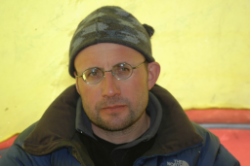Andrei Kurbatov
Education:
State University of New York, Buffalo, New York USA. Ph.D.: Geology. November, 2000. Advisor: Marcus I. Bursik.
Research Area:
My primary research focuses on understanding the Earth’s volcanism and climate. Volcanism is one of the important climate forcing component. In order to fully understand interactions of the volcano – climate system it is important to study past, preinstrumental records of volcanism and to evaluate impacts of selected volcanic eruptions on the climate system. Unfortunately, only limited instrumental and sporadic observational data of global volcanism are available. One of the most robust methods to reconstruct details of the impacts of volcanism on the past atmosphere (climate) is to study volcanic products (e.g., tephra and aerosols preserved in ice cores). Such volcanic products are found embedded into the snow on polar ice caps, and allow us to reconstruct the source, magnitude and timing of volcanic eruptions. Sampled layer by layer, ice cores capture paleoclimate records, including impacts of volcanic events.
Reconstruction of past climate is based on establishing proxies by correlating glaciochemistry, stable water isotopes, captured gasses and dust particle content measurements from ice core samples with available instrumental climate data. Participation in the Siple Dome A deep Antarctic ice core project helped to develop a 10,000 year long continuous record of volcanism, and currently I am working on reconstruction of volcanism from the WAIS, ITASE, RICE and South Pole ice cores. My expertise in multidisciplinary research provides a unique perspective to establish future research projects that incorporate the impacts of volcanism on climate.
In cooperation with Dr. Nelia Dunbar (New Mexico Tech., USA) we were able to begin adding unique geochemical and stratigraphic characteristics of eruptions from Antarctica to the recently established Antarctic tephra data base (AntT). Our goal is to collect a comprehensive data set for identification of potential eruption sources and specific events using geochemical fingerprinting. Soluble and insoluble ice chemistry data may provide additional details about the timing of eruptions, mechanisms of transport and deposition. Emerging laboratory methods (e.g. laser ablation ICP-MS on ice), integrated with the continuous melter system “Laser based particle counters” should allow development of new high-resolution records that can capture single events. By developing new cyberinfrastructure for advance data integration, processing, integration and visualization, all new data sets will be used to help improve our understanding of the mechanisms of how volcanism impacts climate by adding volcanic forcing time series to climate models. The potential benefits of the research is development of long term records of volcanism that will also help to mitigate potential volcanic hazards in selected regions of the world.
Download my cv as a PDF file.
Opportunities:
I am often seeking undergraduates and graduate students. For graduate students, please apply through UM graduate school program. For undergraduate research opportunities, please email me a CV and something about your interests.
Lab Facilities:
Cold Storage and Continuous Melter System Laboratory
Ice Core Microparticle and Tephrochronology Laboratory
Graduate Student Advisees:
Nicole Spaulding (Ph.D., September 1, 2009—April 25, 2013)
Donna Kalteyer (M.S., August 1, 2013—December, 2015)
Sarah Wheatley (M.S., June 15, 2015—August, 2018)
Heather Clifford ( M.S., June 15, 2016— May, 2019)
Laura Hartman (M.S., September, 2016—December, 2018)
Heather Clifford ( Ph.D. , June , 2019— May, 2022).
Lela (Lizi) Gadrani (Ph.D., January 2020-present)
Meredith Helmick (M.S., June 2020-present)


 https://orcid.org/0000-0002-9819-9251
https://orcid.org/0000-0002-9819-9251